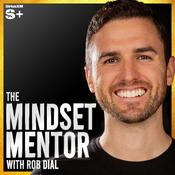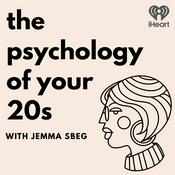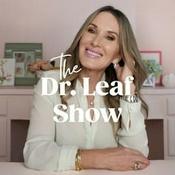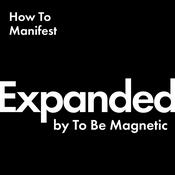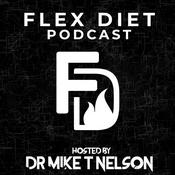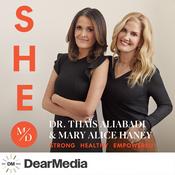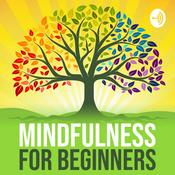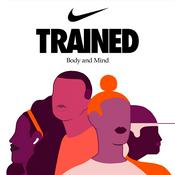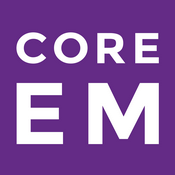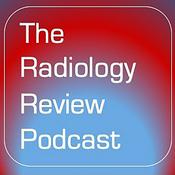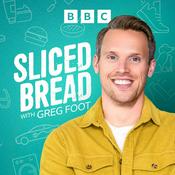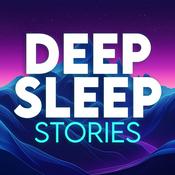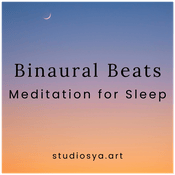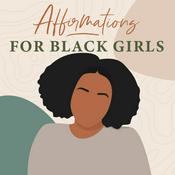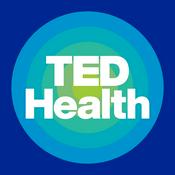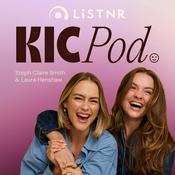Strong Enough by Eating Disorders Families Australia
Eating Disorders Families Australia - EDFA
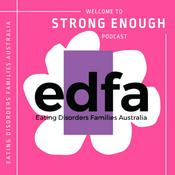
Latest episode
22 episodes
- In a world first Australia is raising the age of access to social media from 13 to 16.
And there are plenty of questions:
Why are we changing the age of access to social media?
What are the impacts of social media on the brain?
Why should parents support the social media ban for teens?
How can we help young people with social media withdrawal symptoms?
“The current 13 year old minimum age isn’t based on any meaningful development appropriateness for social media. There is not evidence that 13 year olds are in fact ready for social media. The 13 year old minimum came from a law in the US from 1996, which was actually well before smartphones or social media was even fully developed.” – Dr Simon Wilksch
This podcast is an edited version of one of EDFA’s live webinar series. It was held just a couple of weeks before the introduction of the social media restrictions.
In it we take a closer look at how social media affects the brain, from falling IQ and eating-disorder risk, to what withdrawal can look like when access to social media platforms is restricted. We also hear powerful insights from social media users who’ve been caught up in the algorithms themselves.
“We know that when you're on a device you're not socialising, when you're on a device you are not using your working memory in the same way, you're not actually coming up with new ideas or your curiosity and those things are what is really affected in the IQ test as well.” – Dr Mark Williams
The panel includes:
Dr Simon Wilksch, a leading Australian researcher and psychologist at Advanced Psychology Services. He explains how social media harms mental health, and why these new laws and stronger restrictions really matter, plus has great practical advice about how we can support our young people.
Dr Mark Williams, a leading cognitive neuroscientist and author of Screen Smart Children. He’ll unpack how social media is reshaping our brains and how we can reverse some of the damage that been done, not only inside our heads, but to our real life relationships too.
We’re also joined by two young women, Kayla Carusi and Charley Breusch, who know firsthand just how powerful and overwhelming social media can be when it comes to disordered eating. These young women share how they believe social media contributed to the development of their eating disorders and also how it hindered their recovery.
#edfa
#eatingdisordersfamiliesaustralia
#socialmediareset
#letkidsbekids
#socialmediaagerestrictions
#socialmediaagechange
#socialmediabrain
#arfid
#eatingdisorders
#anorexia
#bulimia
#eatingdisorderrecovery
Hosted on Acast. See acast.com/privacy for more information. Brain chemistry, bacteria and best nutrients for eating disorder recovery with Dr Leanne Barron
2025/9/30 | 39 mins.“Causes of an eating disorder” would have to be one of the most searched questions by carers wanting to understand or find a solution to their loved one’s eating disorder.
But could it be that disordered eating is caused by a perfect storm of brain chemistry?
Our guest on Strong Enough Dr Leanne Barron believes with the right interventions, including the introduction of the right gut bacteria and even just trace nutrients, we can restore the delicate balance to jump start recovery after an eating disorder.
Dr Barron is a GP and clinical researcher, with a special interest in eating disorders, working at The Banyans Medical Centre and the QUT Eating Disorder Clinic.
She is full of practical advice for carers of a loved one with an eating disorder on repairing the mind and body. She also has tips on nutrition, waking the body from its triggered hibernation and even reading blood tests properly.
**DISCLAIMER: it is important you speak to your loved one’s medical team about any treatments, blood tests or supplements because every case is unique. Underlying medical conditions, like coeliac disease should also be investigated.
Dr Barron will also walk us through the biology we need to understand how brain chemistry impacts both our mental AND physical health. It might surprise you to find that old foe cholesterol is actually an important friend to those with eating disorders.
Some of the products Dr Barron recommends in this podcast - please check with your own GP and treatment team before use - include:
S Bifido Biotic: Orthoplex White S.Bifido Biotic 60c - BioConcepts
MultiGen Bioti: Orthoplex White MultiGen Biotic 60c - BioConcepts
Ultra GG Immune: Orthoplex White Ultra GG Immune 60c - BioConcepts
Pentavite multi gummies
#eatingdisorderrecovery
#edrecovery
#leannebarron
#edfa
#eatingdisordersfamiliesaustralia
#anorexiatreatment
#eatingdisorderbrainchemisty
#causesofeatingdisorders
Hosted on Acast. See acast.com/privacy for more information.- When you hear from your loved one the words “I want to be more healthy” – it’s not what think of as a potential red flag for disordered eating or even something to worry about.
But for Jason Wood this desire to improve his health started his obsession with only eating healthy food, choosing the healthiest options and exercising, which escalated into an eating disorder that nearly killed him.
What is an obsession with eating health called?
It’s known as Orthorexia and it is fixation with eating “clean” or only eating food the person considers healthy.
“What had started as an innocent thing - I thought I was just going to eat healthy and take care of myself and prevent disease - very rapidly turned into something that nearly cost me my life,” explains Jason.
This is an edited version of a presentation Jason did for eating disorder carers as part of a webinar series run by Eating Disorders Families Australia. If you’d like to access more content like this then join EDFA, it costs as little as a cup of coffee a month.
Jason has also written a book called Starving for Survival.
If you have concerns and want more information about this or other early signs of disordered eating, then download the free Nourish Nurture Notice Masterclass.
#orthorexia
#obsessedwithhealthyeating
#edfa
#disorderedeating
#anorexia
#worriedabouthealthyeating
#bulima
#carersupportanorexia
#eatingtoohealthy
Hosted on Acast. See acast.com/privacy for more information. - It’s been just over a decade since AFRID or Avoidant Restrictive Food Intake Disorder was officially identified as an eating disorder.
ARFID is not about dieting or body image or weight loss, but the symptoms and signs of ARFID can often be mistaken for anorexia or bulimia
It is more than being a fussy eater or a picky eater. There can be a fear of food, anxiety around swallowing or chewing or eating in public, or an extreme sensitivity to taste, texture or smell. Sometimes it might be related to a trauma, such as a hospital stay or emotional event around food or to neurodivergence. Another sign of ARFID might be the reduction in the variety of foods someone might eat.
Shannon’s 5 year old son Jasper was diagnosed with ARFID after a series of unrelated events – a choking incident, a vomiting bug, tonsilitis, then the death of a loved one. It was a slow progressive issue with food and then he didn’t eat for weeks.
A reminder that this podcast is about one family’s experience with ARFID - it’s important you also seek your own professional help for your loved one as every individual case is different.
#arfid
#arfidsigns
#AvoidantRestrictiveFoodIntakeDisorder
#arfideatingdisorder
#eatingdisorders
#edfa
#eatingdisordersfamiliesaustralia
#eatingdisordercarertips
Hosted on Acast. See acast.com/privacy for more information. - Disordered eating is on the rise in Australia and there are some common signs of eating disorders that parents and carers often miss. Disordered eating can range from the more well known restriction on the amount of food, to only eating one or two specific foods or being afraid to eat because you’re worried you might choke. Another potential sign of disordered eating can be an obsession with clean eating or a restrictive so called “healthy” diet!
If you have ever wondered about those tell-tale early indicators of an eating disorder then the Nourish Nurture Notice program’s Masterclass is something every carer needs to see.
This podcast episode is an edited version of that Masterclass video, which is part of Australia’s first ever online eating disorder prevention program for parents, that focuses on early identification and intervention in disordered eating in young people.
Nourish Nurture Notice, which also includes free drop-in sessions, was developed by Eating Disorders Families Australia along with the Embrace Collective and is supported by The Queensland Government.
In the full Masterclass video we speak to Paediatric Dietitian Dr Lyza Norton and Paediatrician Dr Penny Larcombe about their experience speaking to thousands of carers, what they hear the most about the early signs carers miss and what to do next.
As well as personal stories and advice from EDFA’s Executive Director Jane Rowan and Fill the Gap counsellor Rowena Brookes.
Nourish Nurture Notice is an Australian first and an important step in eating disorder prevention.
#edfa
#embracecollective
#eatingdisorders
#whatisdisorderedeating
#adviceforcarers
#edadvice
#eatingdisorder
#ARFID
#bulimia
#anorexia
Hosted on Acast. See acast.com/privacy for more information.
More Health & Wellness podcasts
Trending Health & Wellness podcasts
About Strong Enough by Eating Disorders Families Australia
You are STRONG ENOUGH. This podcast is brought to you by EDFA - Eating Disorders Families Australia - an organisation caring for carers around the country. Hosted on Acast. See acast.com/privacy for more information.
Podcast websiteListen to Strong Enough by Eating Disorders Families Australia, The Mindset Mentor and many other podcasts from around the world with the radio.net app

Get the free radio.net app
- Stations and podcasts to bookmark
- Stream via Wi-Fi or Bluetooth
- Supports Carplay & Android Auto
- Many other app features
Get the free radio.net app
- Stations and podcasts to bookmark
- Stream via Wi-Fi or Bluetooth
- Supports Carplay & Android Auto
- Many other app features


Strong Enough by Eating Disorders Families Australia
Scan code,
download the app,
start listening.
download the app,
start listening.

